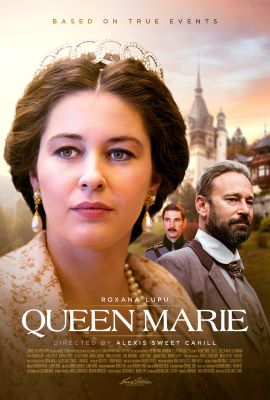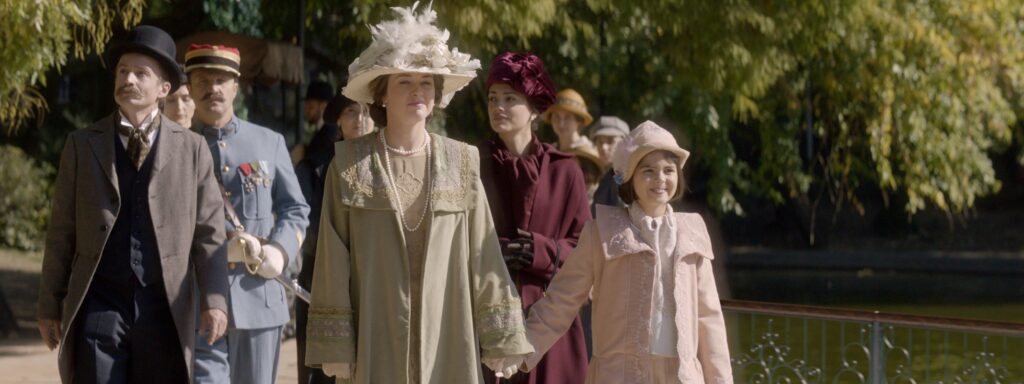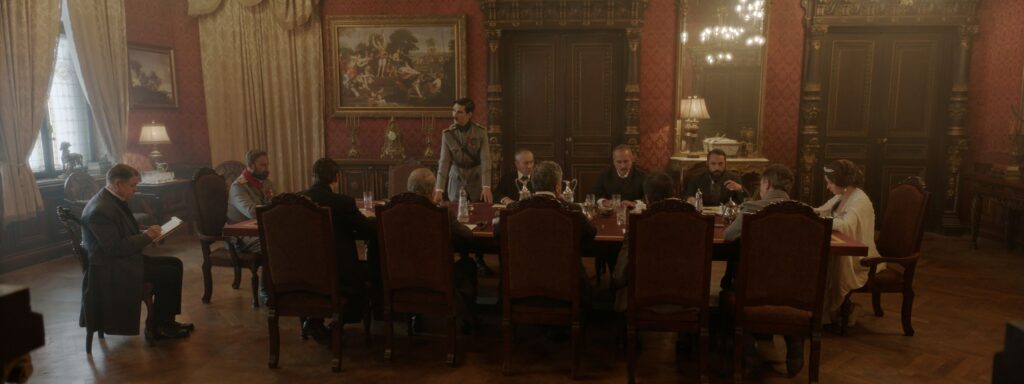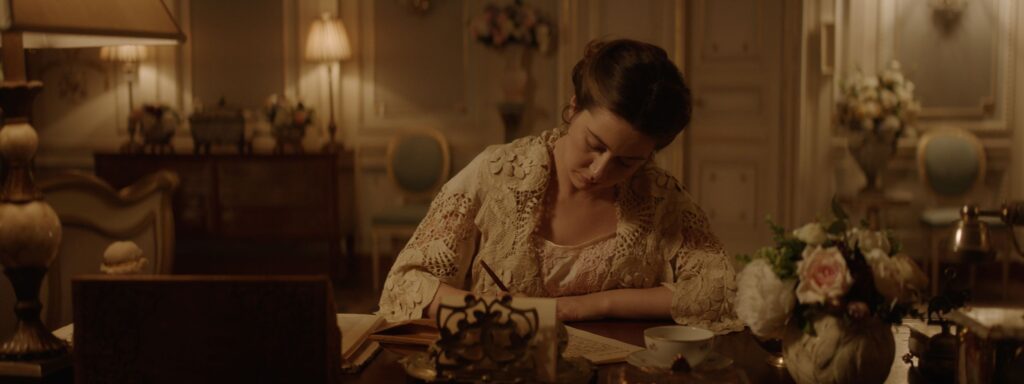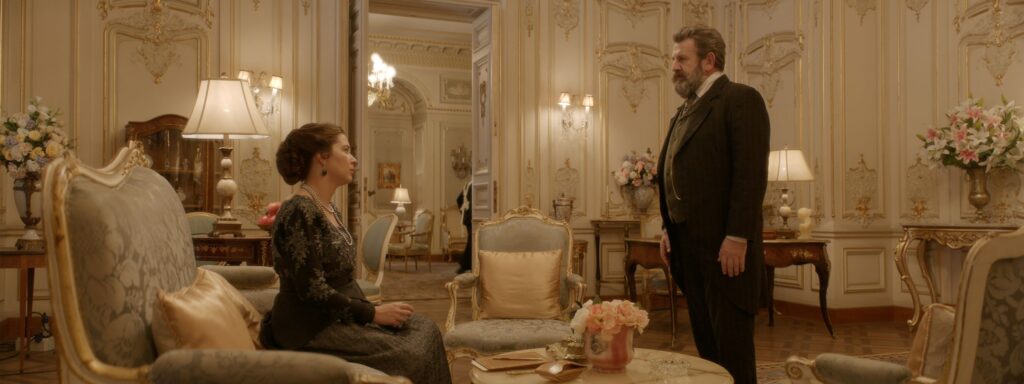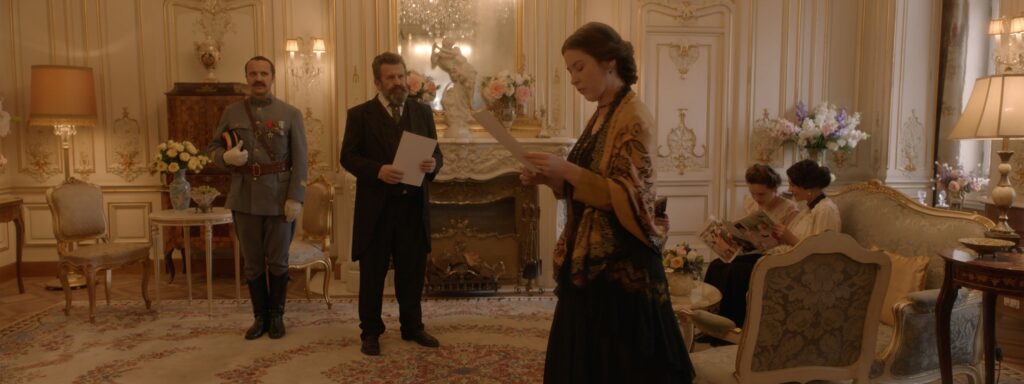QUEEN MARIE
“Oh, life is a glorious cycle of song,
a medley of extemporanea,
And love is a thing that can never go wrong,
and I am Marie of Romania.”
Until today pretty much all I knew about Marie of Romania was contained in the above quatrain by Dorothy Parker. What little impression I had was of a slightly preposterous figure out of Ruritanian operetta. Queen Marie sets the record straight in no uncertain terms.
Princess Marie of Edinburgh was born in 1875, one of Queen Victoria’s countless grand daughters. At the age of seventeen she was coerced into a dynastic marriage with Crown Prince Ferdinand of Romania. As a good royal and a good Victorian, Marie had a highly developed sense of duty and became a passionate champion of her adopted country. This passion is at the heart of Queen Marie.
The story begins at the end of WWI. Initially neutral, Romania is invaded by Germany in 1916 and enters the war on the side of Britain and France. As one of the victorious allied nations, Romania earns a place in the Paris Peace Conference of 1919. Negotiations break down between Romanian Prime Minister Bratianu and French Prime Minister Clemenceau and Marie, against the advice of her own ministers, decides to represent Romania herself.
Her arrival in Paris causes a sensation; not only is she the only female delegate at the conference, but as queen of an Eastern European nation she radiates an exotic aura. Unlike most royal figures, even today’s, Marie understands the power of publicity and her carefully crafted image of mother and savior of Romania is eagerly embraced by the press.
Needless to say, the delegates at the peace talks, led by President Woodrow Wilson, are highly suspicious of Marie’s popularity, seeing her as a distraction from the serious work of carving up Europe for the post-war world. Nevertheless, she proves a shrewd negotiator in encounters with Wilson, Clemenceau and Britain’s prime minister Lloyd George. By the time the conference is over, Marie has gained official recognition and aid for her beleaguered Romania and she returns to Bucharest in triumph.
Possibly aware that I’m not alone in my ignorance of this subject-matter, director Alexis Sweet Cahill opens his film with a crash course in Balkan politics. Newsreel footage of battle scenes dissolves into dramatic action, color seeping in as Romania’s precarious position in postwar Europe is established. This documentary approach gives historical context to a story that unfolds in an unfamiliar time and place.
Romanian actress Roxana Lupu is outstanding as Marie, embodying the magnetism and authority the real Marie must surely have possessed. Playing much of the role in English, her slight, very attractive accent is not inappropriate; although Marie was born and raised in England, her mother was Russian and many of the British royal family of her youth, notably George V’s Queen Mary, had German accents. Inevitably, Lupu dominates the film, but there is excellent work from a large supporting cast of Romanian, British and American actors. Daniel Plier makes for a kingly King Ferdinand and is touching in his rather formulaic scenes alone with Marie, and Anghel Damian is wonderfully sinister as the envious Prince Carol. Among the conference participants Richard Elfyn stands out as Lloyd George, reluctantly won over by Marie’s charm and diplomatic skills.
Production values are high (art direction by Nora Dumitrescu and Russu Laura). A Romania of dark political enclaves and fairy-tale castles is beautifully evoked in Gabriel Kosuth’s cinematography, and when the story moves to Paris we are treated to as many gilded ballrooms, hotel suites and audience chambers as the subject demands. In one spectacular exterior scene Paris’s Place Vendome is filled with 1919 vehicles and extras for Marie’s arrival – at the Ritz of course!
Costume-wise, Claudia Bunea and Ana Ioneci provide all the uniforms, ball gowns and peasant rags one would expect, though given the real Marie’s reputation as a clothes horse, some of movie Marie’s wardrobe choices look a trifle haphazard, especially in the millinery department. And speaking of hats, wouldn’t prime minister Clemenceau have removed his while saying goodbye to Marie at Gare de Lyon?
If Cahill and co-writers Brigitte Drodtloff, Ioana Manea, and Maria-Denise Teodoru are occasionally pedantic in their dutiful recounting of historic events, it’s one of the pitfalls of the genre. Given the current fascination with all things royal, however, Queen Marie will no doubt find a receptive audience. Marie’s work at the Peace Conference was unquestionably her greatest political triumph, but subsequent events in her life were sufficiently colorful to warrant a possible sequel. The subject matter here may be less relatable to an American audience than, say, The Crown, but it’s an absorbing portrait of a remarkable woman.
photos courtesy of Samuel Goldwyn Films
Queen Marie
Abis Studio Production | Samuel Goldwyn Films
106 minutes | 2019 | English/Romanian/German
on-demand and digital on May 7, 2021
